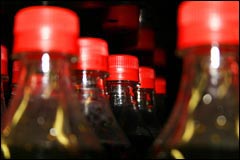Climate Technology
All Stories
-
Sustainability visionaries see room for hope in our worry-filled world
Who’s afraid of the big, bad future? Al Gore, clearly — and pretty much anyone who has seen An Inconvenient Truth. While Gore’s dissenters may argue that he cries wolf too often, no one who knows and understands the statistics used in the film can doubt that the Big Bad Wolf of climate change is […]
-
Box Populi
Wal-Mart will push suppliers to reduce packaging by 5 percent In its latest effort to woo enviros (and, of course, save some dough), Wal-Mart has unveiled a five-year plan that it believes will reduce packaging on the products it sells by 5 percent. Speaking at the Clinton Global Initiative meeting on Friday, Wal-Mart CEO Lee […]
-
Biz Bang
Big business increasingly acting to fight climate change More and more big companies are waking up and smelling the climate change, recognizing that it could have a notable impact on their bottom lines, according to the fourth annual survey by the Carbon Disclosure Project. The CDP, backed by large institutional investors, got responses from 360 […]
-
Alisa Gravitz, director of Co-op America, answers questions
Alisa Gravitz. What work do you do? I have the great pleasure of serving as Co-op America’s executive director. What does your organization do? Co-op America uses the power of the marketplace to solve social and environmental problems. Our name itself stands for the idea of people in their economic roles (as consumers, workers, investors, […]
-
And possibly sell them
My, my. Google searches, finds cause:
According to people briefed on the program, the organization, called Google.org, plans to develop an ultra-fuel-efficient plug-in hybrid car engine that runs on ethanol, electricity and gasoline.
They have about $1 billion in seed money.
This is an extraordinary development.
-
How Mexico’s iconic flatbread went industrial and lost its flavor
In a spectacle similar to the one conjured up by the U.S. Supreme Court in 2000, a Mexican judiciary panel handed the nation’s presidency to Felipe Calderón last week. Even The New York Times, in its circumspect way, acknowledged that the new president-elect’s narrow victory over leftist rival Andrés Manuel López Obrador involved seemingly illegal […]
-
Congress grills BP execs on Alaska spills
BP executives were under fire in Washington, D.C., this week for failing to prevent two oil leaks that occurred earlier this year in the largest oil field in the country. The company willfully ignored pipeline corrosion and harassed employees who voiced concern, Congressional representatives say.
The first leak occurred last March, spilling 5,000 barrels of oil onto the Prudhoe Bay's western tundra. The second, in early August, forced the closure of half the oil field after further testing found significant corrosion in pipelines.
The nearly five hours of questioning on Thursday focused largely on BP's failure to monitor the pipelines with a "smart pig," a diagnostic device that detects corrosion. The eastern line had not been "pigged" since 1992, and the western line since 1998.
-
Coffee giant may be involved in deforestation in Indonesia

For being a big-ass chain, Starbucks Coffee at least has a reputation as a socially responsible big-ass chain.
They've partnered with Conservation International for their Conservation Coffee program, "to encourage environmentally sound coffee-growing practices and to improve farmer livelihoods" in Mexico, Colombia, Peru, "and other Conservation Coffee™ sites around the world" that apparently don't warrant mentioning.
They recycle "at 1,544 of our stores, of which 61 percent have a recycling program." (Side note: I'm spoiled here in hippie Seattle, but it's depressing that there are Starbucks stores "located in communities where commercial recycling facilities are not available.")They've got a composting program, Environmental Footprint Team, and green thoughts about store design and operations.
But then there's this (it's from April -- you know, I've been busy):
-
Coca-Cola learns a tough lesson about corporate sustainability
In January 2006, the University of Michigan suspended the purchase of Coca-Cola products on its campus. Corporate decision-makers should pay heed: this event is notable on several dimensions. Coke learns that CSR is the real thing. Photo: iStockphoto First, this decision was not due to any problems with product or pricing. Instead, the university cut […]
-
Cigarette company targets environmentalists
Although I'm no fan of the cigarette companies, I have to give credit where credit is due. They have often been on the cutting edge of advertising and marketing. Marlboro made it cool for men to smoke, Virginia Slims made it cool for women to smoke, and Camels made it cool for -- well, let's not go there.
Flipping through Newsweek the other day, I came across an ad for American Spirit. Since I'm a non-smoker, I didn't realize there was a cigarette company marketing itself as the "organic" cigarette manufacturer. As I was rolling my eyes at the advertisement, a silver lining emerged from the cloud of tobacco smoke.
